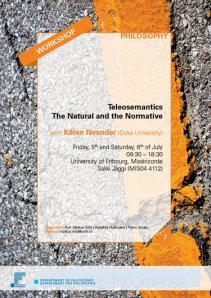Workshop: “The Natural and the Normative” with Karen Neander (Duke University)
from Friday, 5 July 2013 to Saturday, 6 July 2013 University of Fribourg (Switzerland)
Workshop with Karen Neander (Duke University)
“The Natural and the Normative”
Friday, 5th of July, 09:30 – 18:30 and Saturday, 6th of July, 09:00 – 18:00
University of Fribourg, Miséricorde, Salle Jäggi (MIS04 4112)
Organizer: Prof. Markus Wild, Rebekka Hufendiek, Pietro Snider
***
Please register by sending a message to markus.wild@unifr.ch
***
Friday, 5.6.2013, Salle Jaeggi (room 4112)
09:30-10:00 Karen Neander
Introduction
10:00-11:00 Stephan Schmid (Berlin)
Brentano’s Problem
11:15-12:15 Lena Kästner (Bochum)
Locating Content in Science
14:00-15:00 Raphael Scholl (Bern)
The (SE) Functional Analysis
15:00-16:00 Norman Hammel (Gießen)
The Origins of Content
15:30-17:30 Rebekka Hufendiek (Fribourg)
Norms of Nature
17:30-18:30 Christian Steiner (Zürich) & André Wunder (Zürich)
Functions Update
Saturday, 6.7.2013, Salle Jaeggi (room 4112)
09:00-10:00 Pietro Snider (Fribourg)
Simple Minds
10:15-11:15 Tobias Huber (Basel)
Response Functions
11:15-12:15 Fabian Hundertmark (Bielefeld)
Content Determinacy Challenges
13:30-14:30 Peter Schulte (Bielefeld)
Content Determinacy Challenges
14:30-15:30 Marc Artiga (Barcelona)
Inner Analogs
16:00-17:00 Markus Wild (Fribourg)
Becoming Abstracted
17:00-18:00 Ulrike Pompe-Alama (Stuttgart)
Concepts and Conceptions
***
Contents of Karen Neander’s Book
1. Brentano’s Problem (introduces the traditional philosophical problem of intentionality and gives an overview of what is to come)
2. Locating Content in Science (introduces the related problem concerning representation in philosophy of science, using as an example some research into a visual deficit)
3. The (SE) Functional Analysis (aims to explain the role of the ‘normative’ and teleonomic functions in operational explanations in physiology)
4. The Origins of Content (argues that mental content arises as a theoretical entity in science in talk about information processing/carrying functions)
5. Norms of Nature (argues that psychosemantic norms are not genuinely prescriptive and so it is not a problem if functional norms are not genuinely prescriptive)
6. Functions Update (summarizes and updates my view on functions)
7. Simple Minds (closely based on my “Content for Cognitive Science”, concerns toads and argues for stimulus-based rather than benefit-based visual contents)
8. Response Functions (argues that there can be functions to respond to something and that there can be information carrying functions on a causal construal of information)
9. The Content Determinacy Challenges (explains how a causal version of teleosemantics meets the various content determinacy challenges)
10. Inner Analogs (makes room for a role for 2nd-order similarity in the content determining conditions for perceptual representations)
11. Becoming Abstracted (discusses strategies for meeting Berkeley’s problem of abstraction)
12. Concepts and Conceptions (discusses the relation between referential/intentional content and intensional content).
Organiser(s):Prof. Markus Wild, Rebekka Hufendiek, Pietro Snider

